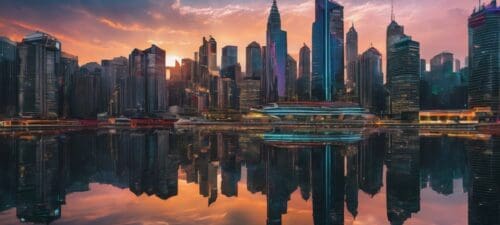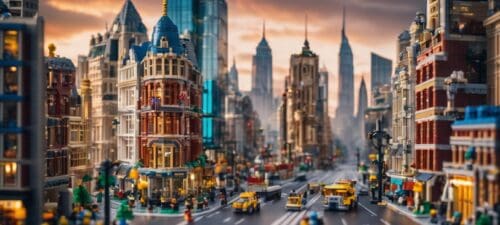Eco: Building a Sustainable World Together

Updated On: November 22, 2025 by 
Building a greener future can sometimes feel like an overwhelming challenge, can’t it? Rest assured, we’re all navigating these waters together. Interestingly enough, making the switch to a vegan diet could help us cut down agricultural emissions by as much as 70%.
Our blog is set to delve into how each of us can contribute, from forging tech partnerships to rethinking our daily choices. Why not join us for an enlightening read and explore practical steps towards sustainability that genuinely make a difference? Let’s embark on this journey towards a healthier planet together – your eco-conscious effort counts!
The Importance of Collaboration
Partnering with technology companies and driving operational efficiencies are key in advancing sustainable practices. Working alongside systems integrator and advisory partners can lead to business transformation through innovative solutions.
Partnering with technology companies
We are teaming up with forward-thinking tech companies to push the boundaries of what’s possible in creating sustainable business practices. These partnerships bring about innovative solutions that reduce our carbon footprint and drive us closer to carbon neutrality.
By incorporating cutting-edge renewable energy technologies and embracing an eco-friendly approach, we enhance environmental health while maintaining a competitive economy.
Together, we’re optimising smart places—spaces where technology ensures maximum efficiency while minimising impact on the earth. We share a commitment to responsible supply chain practices by encouraging ethical business dealings and conservation of natural resources.
Through leveraging collaborative effort with these partners, we transform businesses into models of corporate responsibility, setting new standards for social and environmental impact.
Next, let’s explore how device partners contribute to this collective mission through programmes like the Microsoft Authorised Refurbisher initiative.
Sustainable practices driven by partner innovations
Partner innovations are driving sustainable practices, allowing for the adoption of eco-friendly solutions across various industries. By collaborating with technology companies, we can leverage cutting-edge advancements to optimise smart places and drive operational efficiencies.
Additionally, responsible supply chain practices are being enhanced through partner-driven innovations, promoting ethical business practices that align with environmental sustainability.
Furthermore, business transformation is being accelerated through solutions from systems integrator and advisory partners. This collaboration enables us to embrace ecoconsciousness and integrate green initiatives into our operations, contributing to a more sustainable future for all.
Optimising smart places
Smart places are critical in achieving sustainable development and combating climate change as nearly 60% of the world’s population will live in urban areas by 2030. Green buildings play a vital role in this, minimising energy and water consumption while preserving natural resources.
This optimisation leads to cost savings, higher ROI, and environmental benefits, contributing significantly to eco-friendly practices within corporate sustainability efforts.
Moreover, green construction improves the quality of life by creating liveable cities that harmonise with nature. By committing to becoming water positive and zero waste while protecting more land than we use, smart places embrace sustainable development and offer opportunities for innovation.
Driving operational efficiencies
Optimising smart places has a direct impact on driving operational efficiencies within sustainable initiatives. Green buildings, with their advanced technologies and energy-efficient systems, contribute significantly to reducing consumption of resources such as water and energy.
Implementing smart technologies like automated lighting, heating, and cooling systems further optimises energy usage in these eco-friendly structures. Additionally, sustainable practices like waste reduction and responsible supply chain management also play a crucial role in improving operational efficiencies across various industries.
By integrating innovative solutions into operations, businesses can achieve significant cost savings while minimising their environmental footprint. Sustainable urban development leverages these technological advancements to create liveable cities that are harmonious with nature—encouraging game experts and gamer novices alike to embrace ecofriendly practices at all levels of society.
Responsible supply chain practices
– Driving operational efficiencies can also be achieved through responsible supply chain practices, ensuring that the sourcing and production of goods are conducted in an environmentally friendly and sustainable manner.
By partnering with ethical suppliers who adhere to fair labour practices and environmentally conscious manufacturing processes, we contribute towards a more sustainable world. Sustainable supply chain management not only reduces carbon emissions but also supports local economies and fosters social responsibility within our business network.
Moreover, by implementing responsible supply chain practices, we support the conservation of natural resources while promoting ethical treatment of workers and communities along our supply chain.
Business transformation through solutions from systems integrator and advisory partners
In order to drive operational efficiencies and further our commitment to sustainability, we embrace business transformation through solutions offered by systems integrator and advisory partners.
These collaborations enable us to leverage innovative technologies and sustainable practices that optimise smart places, reduce environmental impact, and advance responsible supply chain practices.
By working with these strategic partners, we enhance our capability to incorporate eco-friendly solutions into our operations and continuously improve our sustainable initiatives.
Collaborating with systems integrator and advisory partners also allows us to tap into their expertise in green building, renewable energy integration, and waste reduction strategies.
The Role of Device Partners
Promoting sustainability through the Microsoft Authorised Refurbisher programme allows us to give new life to older devices, reducing electronic waste and supporting environmental initiatives.
With our device partners, we are committed to creating a more sustainable world for future generations.
Promoting sustainability through the Microsoft Authorised Refurbisher programme
The Microsoft Authorised Refurbisher programme encourages sustainability by giving older devices a new lease of life. This initiative significantly reduces electronic waste and promotes the responsible use of resources.
By refurbishing and redistributing these devices, we contribute to the reduction of carbon emissions associated with manufacturing new electronics. Additionally, this aligns with our commitment to environmental protection, as highlighted in our plans to become water positive and zero waste.
By partnering with Microsoft through sustainable initiatives such as the Authorised Refurbisher programme, communities can benefit from affordable access to technology while contributing to global sustainability goals.
Giving new life to older devices
In the sustainable push to reduce electronic waste, eco-conscious gamers can make a real impact by championing device refurbishment. By participating in programmes like the Microsoft Authorised Refurbisher initiative, we promote sustainability and lessen environmental impact.
This movement sees older devices given new life, extending their usefulness and reducing unnecessary electronic waste. It’s an opportunity for us all to contribute positively towards a more sustainable future.
Moving forward, let’s delve into our role in empowering communities through the Community Eco-Swap initiative, which focuses on waste reduction and environmental sustainability while promoting poverty alleviation.
Community Eco-Swap
Empowering communities through waste reduction, poverty alleviation, and environmental sustainability. A holistic approach to creating a sustainable future with human stories and community impact.
Empowering communities through waste reduction, poverty alleviation, and environmental sustainability
We empower communities through sustainable practices, such as waste reduction and poverty alleviation. As we strive for environmental sustainability, we address critical societal issues. Our efforts focus on creating a holistic approach towards building a better future.
- Implementing innovative recycling programmes to reduce waste and protect natural resources.
- Providing vocational training and job opportunities to alleviate poverty and foster economic growth within communities.
- Supporting local agriculture and small – scale farmers to promote sustainable food production and reduce reliance on environmentally damaging practices.
- Collaborating with local authorities to implement eco-friendly infrastructure and promote energy-efficient solutions for community development.
- Educating community members about sustainable living practices, biodiversity conservation, and the importance of environmental stewardship.
- Partnering with non – profit organisations to enhance access to clean water, sanitation facilities, and renewable energy sources in underserved areas.
- Organising community clean – up events, tree planting drives, and awareness campaigns to engage citizens in environmental conservation efforts.
A holistic approach to creating a sustainable future
To create a sustainable future, we must take a comprehensive approach that considers environmental, social, and economic factors. By promoting sustainable practices in our communities, businesses, and personal lives, we can reduce carbon emissions, conserve natural resources and improve the quality of life for everyone.
This holistic approach involves empowering individuals and communities to make eco-friendly choices while also encouraging collaboration with technology partners to drive innovations that support sustainability goals.
By embracing a holistic approach to creating a sustainable future, we have the potential to address climate change challenges effectively. We can work towards building resilient urban infrastructure, minimising energy consumption in green buildings and promoting responsible food choices that reduce agricultural emissions.
Human stories and community impact
Transitioning from the holistic approach to creating a sustainable future, let’s delve into human stories and community impact. Communities around the world are coming together to make a remarkable difference in environmental sustainability.
In India, an initiative called “Eco-Swap” has empowered women to create eco-friendly products from recycled materials, reducing waste while alleviating poverty. The impact of these initiatives reaches far beyond environmental benefits, providing economic opportunities and improving livelihoods for individuals within the community.
In addition, we learn about Amal Fellowship members who have embarked on projects focused on waste reduction and environmental conservation within their communities. These inspiring journeys reflect the power of collective action in addressing pressing environmental issues.
Personal Reflections from Amal Fellowship
Sharing personal growth experiences, fundraising successes, and leadership potential unlocked through the Amal Fellowship program. Discover the power of empathy and community impact in creating a sustainable future.
Read more to dive into these inspiring stories.
Unveiling leadership potential
In fostering leadership potential, one essential aspect is the power of empathy. Understanding and connecting with people’s needs can be a driving force in fundraising for noble causes.
By immersing ourselves in the stories and experiences of others, we gain valuable insights that contribute to personal growth and development. Additionally, through the Amal Fellowship programme, individuals have been able to take flight towards new experiences while honing their leadership skills and making an impact on their communities.
Ultimately, it’s about embracing opportunities for personal growth and leveraging them to effect positive change in our world.
Moreover, recognising our own capabilities is vital for unveiling leadership potential. Taking proactive steps towards self-awareness allows us to identify strengths and areas for improvement – critical components in championing sustainability initiatives effectively.
The power of empathy in fundraising for noble causes
Unveiling leadership potential has shown me the power of empathy in fundraising for noble causes. Understanding the needs and emotions of those we are raising funds for can greatly impact our ability to connect with donors on a personal level.
By sharing compelling stories that evoke empathy and compassion, we can inspire others to support noble causes such as poverty alleviation, environmental sustainability, and community empowerment.
Taking flight towards personal growth and experiences has brought me face-to-face with heartwarming human stories that highlight the impact of fundraising efforts. These stories not only resonate with individuals but also help them understand the tangible difference their contributions can make.
Taking flight towards personal growth and experiences
Engaging in the Amal Fellowship has uncovered leadership potential within us and fostered meaningful personal growth. Through empathetic fundraising for noble causes, we’ve learnt to harness the power of our actions in making a positive impact on the world around us.
This journey has opened doors to new experiences, broadened our horizons, and enriched our understanding of global issues.
We are stepping into uncharted territories that push us beyond our comfort zones, nurturing skills vital for personal development. The experiences gained through the fellowship have ignited a passion for effecting positive change and instilled in us an unwavering commitment towards sustainability and environmental stewardship.
Looking Towards the Future
As we look towards the future, we are committed to addressing climate issues through decarbonisation and adaptation. Supporting business and policy leaders, and working with alliance partners will be key in building a sustainable world for all.
Our case studies of climate risk assessment and resilience building provide real-life examples of these efforts in action.
Addressing climate issues through decarbonisation and adaptation
To address climate issues, we can focus on decarbonisation and adaptation. These strategies are crucial for combating the effects of climate change and creating a sustainable future. Here are key aspects to consider:
- Implementing renewable energy sources such as solar, wind, and hydro power to reduce carbon emissions and transition towards a low-carbon economy.
- Developing resilient urban infrastructure that can withstand extreme weather events, such as floods and storms, through innovative construction and design techniques.
- Investing in sustainable transportation systems, including electric vehicles and improved public transit, to decrease reliance on fossil fuels and minimise air pollution.
- Promoting nature – based solutions like reforestation, wetland restoration, and sustainable land management to sequester carbon and enhance biodiversity.
- Engaging in international collaboration to set ambitious targets for emission reductions and foster global cooperation in addressing climate change challenges.
- Encouraging the adoption of green building standards and practices to reduce energy consumption, limit waste generation, and promote healthier indoor environments.
- Empowering communities with education and resources to adapt to changing climate conditions while promoting sustainable livelihoods and preserving natural ecosystems.
Supporting business and policy leaders
Business and policy leaders play a pivotal role in shaping sustainable practices and driving environmental change. By implementing eco-friendly strategies, such as green building initiatives and responsible supply chain practices, they can significantly reduce carbon emissions and minimise energy consumption.
Collaborating with technology companies to optimise smart places and drive operational efficiencies is crucial for achieving these goals. Moreover, working with alliance partners to address climate issues through decarbonisation and adaptation will pave the way for a more sustainable future.
These efforts align with the commitment to become water positive, zero waste, build a Planetary Computer, and protect more land than we use.
In addition to this, supporting business and policy leaders can champion climate risk assessment and resilience building by incorporating innovative solutions from systems integrator partners.
Working with alliance partners
We team up with alliance partners to tackle climate issues and develop solutions. By collaborating with technology companies, we drive operational efficiencies and promote responsible supply chain practices, contributing to a sustainable future.
Our partnerships aim to address climate risk assessment and resilience building through case studies, supporting business and policy leaders in creating a greener world.
Moving forward, let’s delve into the role of device partners in promoting sustainability through the Microsoft Authorised Refurbisher programme.
Case studies of climate risk assessment and resilience building
We have observed case studies where climate risk assessments have been conducted to identify potential vulnerabilities and develop strategies for resilience building. These studies have shown the following:
- In a coastal city prone to flooding, a comprehensive risk assessment was carried out to understand the impact of rising sea levels and extreme weather events on critical infrastructure. This led to the implementation of resilient design measures such as elevated buildings, flood barriers, and improved drainage systems.
- A multinational corporation undertook a climate risk assessment across its global operations to assess the vulnerability of supply chains to extreme weather events, water scarcity, and other climate-related risks. As a result, the company developed contingency plans, diversified sourcing locations, and implemented water conservation measures to enhance resilience.
- A community-based organisation conducted a climate risk assessment in a rural area susceptible to droughts and wildfires. This led to the establishment of community emergency response teams, early warning systems, and sustainable land management practices to mitigate the impact of climate-related disasters.
- A case study highlighted how a city utilised data – driven approaches for climate risk assessment by leveraging advanced modelling techniques to predict future climate scenarios. This enabled urban planners to incorporate resilient urban design principles into city development plans, including green infrastructure, green roofs, and permeable pavement.
- An agricultural cooperative implemented a resilience-building strategy after conducting a climate risk assessment that identified threats posed by changing precipitation patterns and temperature extremes. The cooperative diversified crop varieties, adopted water-efficient irrigation methods, and integrated agroforestry practices to adapt to changing climatic conditions.
- A case study demonstrated how an insurance company used climate risk assessments to develop innovative insurance products tailored for businesses exposed to climate-related risks such as extreme heat events or storm damage. This proactive approach incentivised businesses to invest in resilience measures while reducing insurance claims related to weather-related losses.
Conclusion
Let’s make a difference together by embracing sustainable practices in our communities. Working with technology and device partners can drive real change towards building a greener world.
Let’s harness the power of collaboration to create a future that is environmentally responsible and socially inclusive for all. Join us on this journey towards a more sustainable and eco-friendly world!
FAQs
1. What does “Eco: Building a Sustainable World Together” mean?
“Eco: Building a Sustainable World Together” means working as a community to create a healthier planet by making decisions that are good for the environment.
2. How can we contribute to building a sustainable world?
We can contribute by reducing waste, recycling materials, using less energy and supporting eco-friendly products and practices in our daily lives.
3. Why is it important to think about sustainability?
Thinking about sustainability helps us protect nature, save important resources like water and forests, and make sure there’s a nice place for all creatures to live now and in the future.
4. Can children get involved in building an eco-sustainable world?
Yes! Children can play an important part by learning about how to care for the earth and practicing eco-friendly habits at home and at school.









